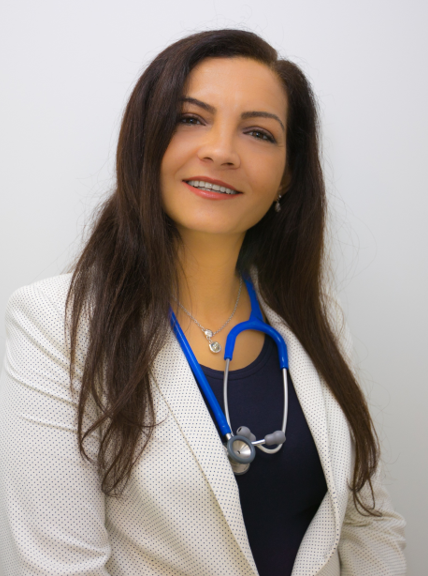A German Pediatrician’s Recipe for Healthier Children in Dubai
03 April 2019
658 views
Dr Rain Osman is a consultant pediatrician educated in Germany. She came to Dubai 7.5 years ago to work at Saudi German Hospital for 5 years before opening up La Familia Medical Centre in Dubai, a polyclinic with pediatric, gynecology, dentistry, dermatology and family medicine departments.
Q: What are pediatric diseases commonly found in Dubai?
More or less Dubai is the same as all other countries in common viruses and flus but the most predominant diseases here are to do with respiratory tract infections due to the sand, dust and A/Cs. Of course, we see many gastroenteritis (stomach flu), diarrheas and vomiting cases, but mostly it is cough and colds, common flus, and obstructive bronchitis. These are the most common diseases you see here.
It also depends on seasons. For example, we have for the last couple of months seen a big epidemic of influenza. Influenza A and B have been a threat since past 2 years now. It was not so bad before. This is aggressive viruses and high temperature stays for at least 7 days, and cough and colds last more than 2 weeks.
We very often have Hand-foot-and-mouth disease as well. It is viral infections that cause rashes on the palms and soles of the feet. It is actually self-limiting and not serious, but quite annoying since the fever is very high and rashes come in the mouth as well not allowing kids to eat and drink properly. It is very contagious as well.
Plus, for babies, roseola virus. It is a very harmless disease for kids but it causes very high fever for 3 days and then it goes away causing an outbreak of rash on the body.
Here most diseases are thought to spread through nurseries and schools. Somebody in the class gets it and I think 90% of the kids will get it too.

Q: What is your principle or approach in treating these common diseases?
You cannot kill the virus, it is self-limiting (i.e., the condition ultimately resolves itself without treatment). Your own immunity will fight. You just treat the symptoms. If you get dehydration, you have to give fluids. If you are vomiting too much, you first let out the virus from the body. Stopping symptoms immediately is also not good. Because it is a way the body is trying to get rid of the virus. If you get diarrhea, vomiting, or cough, your body is trying to get rid of that virus in the secretions. You just try to control the fever and ensure the child is drinking enough fluid. You do not stop it. Only when the child is vomiting too much, you shall try to stop it to avoid dehydration.
In other cases, for example, if it is aggressive type of influenza A or B – which means the child is really bad, that is when you decide to give the child Tamiflu, the medicine of choice, world-wide. Especially for H1N1(swine flu) and avian flu.
Tamiflu is an antiviral medicine but it is also very heavy. If possible, we try to avoid Tamiflu. If the child is fine, there is no need to treat viruses. We only use Tamiflu when the child is really down. For example, fever above 40 degrees Celsius, uncontrollable, weak, coughing with bronchitis or pneumonia or lung infection, that’s when we decide ‘OK, we need help with Tamiflu’. Otherwise, it is all self-limiting.
One of the challenges of pediatricians is convincing the parents that there is nothing wrong with their children. They believe there is something wrong when they get sick so often. To them, the frequency of getting viruses may seem too high here in Dubai. Yes, more than 200 nationalities live here together. If you go out to mall on Friday, you cannot avoid getting all sorts of viruses. However, you should note that this is a way to build immunity, just like giving vaccination. Parents should understand that diseases, like vaccines, eventually make children stronger.
Q: When should parents visit doctors?
I always tell my patients that 3 days of fever is allowed. But there are a few conditions: the child is alert, not weak; drinking enough fluids; and does not change his personality. In case of non-stop diarrhea or vomiting, they are not supposed to wait. Abnormal pain in the tummy, they are not allowed to wait. If you cannot bring down the fever below 40 degrees, you are supposed to come to a doctor. In case of bronchitis, you need to check if the child has breathing difficulty. In earlier ages, if a baby has bronchiolitis, he may need oxygen. If you wait too long and the child has to make too much effort to breathe, his respiratory system could fail, and that’s dangerous. Otherwise, if the child is having fever but playing normal and drinking fluids, then they can wait 3 days.

Q: What is the health advice you would like to give to families recently moved or planning to move to Dubai?
Your body will gradually adjust to the new climate sooner or later. I would rather focus on the mindset: don’t be lazy and find a way to stay active. Be creative. Do swimming, go to parks for barbecues, try Ski Dubai, skate at ice rinks, visit trampoline parks. If you are at home, instead of giving your children iPads, play board games together, read books, or just let them get bored. If you work, try at least to spend one hour of quality time with your kids every day.
Q: We heard you have very strong opinion against using smart devices from earlier age?
Smartphones, Wi-Fi, electromagnetic waves should never be next to the brain of baby before 2 years of age. It is recommended to avoid it as much as we can, or at least within diameter of 2 meters from the brain of the child. The skull of the baby is not yet closed, they have fontanel, which is cartilage not bones yet, so it is so easy to get all this radiation of electro-magnetic waves into the brain, which can interfere with development. The nerves are pathways electrical signals are transmitted, and disturbance in that transmission is caused when there is an interference of electromagnetic waves.
Try as much as possible to limit the screen time of your children. It shouldn’t be over 1 hour and better if you can split it into smaller pieces and put other activities in between. It is proven scientifically that the quick change in the screen and color, or photo stimulation, can provoke epilepsy.
If your teenaged children are so fanatic about their phone, first show them the facts and explain the harmful effects of the smart devices: impaired vision, neck or back pains, migraines or headaches. TED lectures like this could also help them better understand the negative impact of smart devices: https://www.youtube.com/watch?v=F0NEaPTu9oI
Comments
Other Articles
- The Best Prevention for Skin Aging is Education - 13 October 2020
- Learnings from the Frontline - 22 June 2020
- Can COVID-19 Affect New Born Babies? - 14 June 2020
- Traditional Indian Methods to Boost Your Immune System during COVID-19 - 11 June 2020
- Why Sudden Headache, Neck & Lower Back or Foot Pain While Working from Home? - 09 June 2020
- Does wearing mask mean death sentence for cosmetic dentistry? - 03 June 2020
- Aerosols are dangerous. Shall I delay dental treatments? - 03 June 2020
- Does COVID-19 mean no more braces with DIY Dentistry? - 01 June 2020
- Parents in Pandemic: How to Help Children Embrace the New Normal? - 29 May 2020
- Is it Safe to visit Dental Clinics during COVID-19? - 27 May 2020
- Skin Trouble After Wearing Face Masks? - 26 May 2020
- Parents in pandemic: how to keep children healthy and happy - 21 May 2020
- Severe Tooth Pain in the Middle of the Lockdown? - 20 May 2020
- Kids are very good COVID-19 carriers - 19 May 2020
- How pregnant women can boost their immune system during COVID-19 - 15 May 2020
- WORK FROM HOME? Beware of these Bone and Muscle Issues - 13 May 2020
- What happens to my braces? Orthodontic treatments during COVID-19 - 12 May 2020
- You can get Coronavirus through Eyes! Says Dubai Eye Doctor - 11 May 2020
- COVID-19, Perfect Time to Start IVF Treatment? - 10 May 2020
- A Psychiatrist's Advice to UAE Moms During COVID-19 - 07 May 2020
- Dubai OBGYN explains Infertility Procedures during Covid-19 - 04 May 2020
- COVID-19 and Pregnancy in Dubai - 19 April 2020
- Good Vision Not a Sign of Healthy Eyes - 30 March 2020
- The Complete Guide for the Best Dental Implants in Dubai - 14 October 2019
- The A to Z of Braces and Aligners - 10 October 2019
- Why Teeth Brushing at Home is Not Enough? - 09 October 2019
- Everything You Need to Know About Veneers - 02 October 2019
- What Happens If You Neglect Gum Bleeding? - 26 September 2019
- Children Will Never Forgive You for the Toothache - 05 September 2019
- How Dental Implant Surgery can be Pain-free - 03 September 2019
- This Doctor May Solve Your Chronic Headaches - 18 August 2019
- Meet Dr Madhu Matthews at Mankhool Dental Clinic - 07 July 2019
- 5 Ways to Keep Your Skin Healthy in the Middle East - 16 April 2019
- The Right Moment to Consider Plastic Surgery - 03 April 2019
- Obesity is a Disease - 31 March 2019
- South Asians in Dubai Suffer the Most from Heart Disease - 10 March 2019
- Best Braces to Choose: Damon system or Invisalign - 09 March 2019
- Korean Dermatologist Debunks UAE Tap Water Myth - 14 February 2019
- Interview: A Surgeon’s Simple Approach to Complex Surgery - 03 February 2019
- Interview: A Dentist's Playlist for Beautiful Teeth - 23 January 2019
- Interview: This Chairman of a Medical Group Pioneered Keyhole Surgery in the UAE - 08 January 2019
- Interview: Husbands Are Unknowingly Making a Pregnancy Riskier - 07 January 2019
- Interview: How to Make Orthodontic Treatments Affordable? - 20 December 2018
- Interview: Psychiatric Approach to Happiness in Dubai - 20 December 2018
- Interview: The Psychology of Identity Loss in Dubai - 17 December 2018
- Interview: A Humanitarian Approach to Plastic Surgery - 16 December 2018
- Interview: Treat Infertility like Solving a Puzzle - 10 December 2018
- Interview: Dubai's Only Comedian Dentist - 10 December 2018
- Interview: A Holistic Approach to Gynecology in Dubai - 27 November 2018
- Interview: Treat Pain without Surgery - 26 November 2018
- Interview: Best Surgeon in Dubai 2017 - 22 November 2018
- Interview: UAE's Only Female Vascular Surgeon - 28 May 2017
Related Articles
The Best Prevention for Skin Aging is Education
Meet Dr Olga Islomova, a senior beauty and laser aesthetician.
13 October 2020
Learnings from the Frontline
Dr Anil shares his fear, challenges, and learnings as COVID-19 task force leader at a Dubai ...
22 June 2020
Can COVID-19 Affect New Born Babies?
Dr Sridhar shares his first-hand experience on the effect of Coronavirus to new born babies
14 June 2020
Ask Doctors in Dubai
Thank You
Login
Login
Forgot Password?
Register Now
Edit Topic
Edit Comment
Edit Review
Profile Image
Loading...
Please wait...






Enter your comment below
Press 'ENTER' key to submit